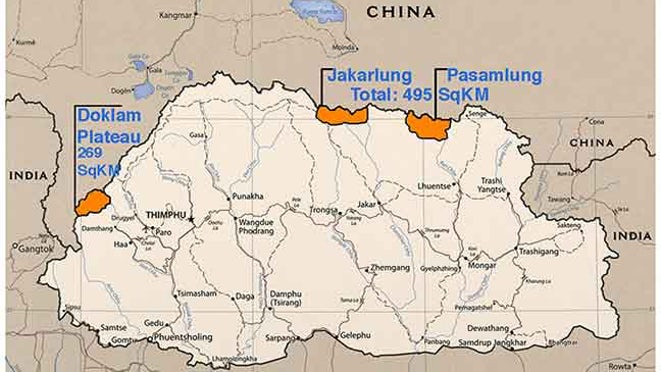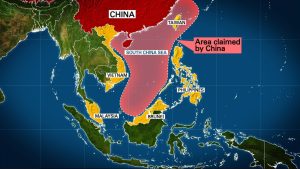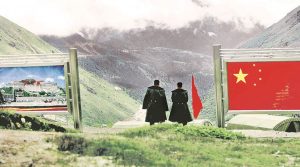
Image Courtesy: Swarajya
https://bharatshakti.in/the-doklam-stand-off-some-lessons/
Editor’s Note
The stand-off at Sikkim is into its third month now with no signs of abating. Both countries continue to glare at each other with China also ratcheting up a media war to cower India that it considers as its bigger enemy in its quest to becoming a global power. The Chinese incursion in Sikkim also throws up a host of lessons. The General, in his article, delves into these and offers a few suggestions that India needs to execute keeping in view the fact that in the days ahead the situation along our borders could pose greater challenges and we are not optimally equipped to face them.
THE DOKLAM STAND OFF – SOME LESSONS

Image Courtesy: CNN
China is turning increasingly belligerent with all its neighbors. Its behavior in the South China Sea has been predatory. Many of the Asia Pacific region countries have attitudes that range from being inimical to suspicious of Chinese intentions and behavior. Off late, its problems with Mongolia and Myanmar are increasing. Its animosity with Japan is on the rise. USA considers its behavior as unacceptable. Even Hong Kong is having problems with the mainland. Through its Belt and Road initiative it wants to be the center of the universe. The signals are that any country which does not toe its line on this initiative is likely to face its wrath. If one puts together all the problems in the Asia Pacific region, it appears the season of discontent with China has set in. Chinese assurances of a peaceful rise seem to be a distantly bad dream.
How to Deal with China in Future
This discontent is exacerbated by an economy under stress. There is a theory that in case China should control its internal debt bubble its industry must go out and earn revenues abroad through projects like the CPEC. Otherwise its bubble will burst and economy could crash. Is China fighting with its back to the wall? Time will tell. However, its aggressive behavior seems to suggest so. The world will hereafter have to be wary and contend with an aggressive and bellicose China which disregards international laws for some time to come. Turning homeward, it is no secret that China is anti-India. Recently it has upped its tone to the extent that, there are views expressed in public domain that it wants to teach India a lesson. It wants a relationship with India as if it is a school master and India is an errant child. India, which it considers its major rival, is fast emerging as a focal point of animosity for China. Hereafter we will have to brace ourselves to deal with a hostile China- the gloves seem to be literally off. In this context, the standoff in Sikkim has some good lessons and will give strategists and planners of India’s fortunes a view on how to deal with China in future.
Anticipating China’s Pinprick
It is now established that every time a major event is to happen, PLAs track record is that it engineers an incident. With India openly saying NO to the Belt and Road Initiative and a meeting of President Trump and Prime Minister Modi on the cards, it should have been expected that China will put up a show. The question is – did we anticipate it? If so, what have we done about it to preempt it or head it off? In hindsight, it appears nothing- at least in public perception. The first lesson therefore is anticipating China’s next pinprick and being proactive about it. Reactive responses always end up in a catch-up scenario. What is the level of pro-action? Needs decision at the highest levels in a calibrated and coordinated manner. The basic issue is that why should we always be responders? It is time we took a well calculated and responsible initiative.
Joint Capability Development – Ignore it at Peril
Let’s assume that the Sikkim standoff escalates into a sectoral firefight. All the questions which I raised in my earlier article- Are We Ready Across the Himalayas? (https://bharatshakti.in/are-we-ready-across-the-himalayas/) come to the fore. The triumvirate which is to insure our national sovereignty – Infantry, Artillery and Indian Air Force in such situations have issues. Everyone knows that our Infantry needs modernization badly. We lack a basic Rifle and there is politics surrounding its acquisition.
Artillery, which is on an upswing, needs focused consolidation. Otherwise gains will be squandered. The IAF seems to be banking on the Strategic Partnership model to come good; which is more than a decade away. The deterrent value of forces which are not optimally equipped is reduced. Unless we have a coordinated and single-minded focus on critical acquisitions we could be in for a rude shock. China seems to be talking with money on the table whereas we are banking on an overdraft. Joint Capability Development is the order of the day. We can ignore it at our peril. In case we want to attempt something proactive our capabilities must be that much more grounded and complete. This is an answer which begs a question.
Chief of Defense Staff- A Crying Need
Let’s, turn our attention to command and control. There is one commander and one theatre handling the situation on the Chinese side. Being a communist country, I’m confident that there is also a political commissar or some such representative handling political issues at all levels. There seems to be a clear coordination between the political, diplomatic and military facets of this situation. China seems to be ahead of the curve in dealing on this issue – in media or diplomatically. In fact, it seems to be a pre-meditated and well-planned action.

Image Courtesy: Business Economics
On our side, we have two Commands handling the sit. They do not sit and talk to each other since the Air Force Commander sits in Shillong and the Army Commander sits in Calcutta. In case the situation spirals each will have his own plan to execute as there is no joint plan or a set of actions to execute in such a situation. Proactive situations will be difficult to conceive and execute through two different commands. Hence, all actions will be reactive to a large extent.
In fact, I wonder how much of a lateral flow of information would have occurred in this entire episode whether the situation was considered grave or not. After all they function with different communication nets which cannot communicate with each other.
As an extension, at Delhi, the Army Chief seems to be the points man or de facto Chief of Defense Staff (CDS) for this situation. What will be the outcome if the CAS has a different viewpoint or the Navy Chief comes up with an indirect option? The government will be sorely handicapped without a CDS. All in all, there is a crying need for two things – Integrated Theatres and a CDS. The case for CDS has been often reiterated repeatedly. I can only reinforce the last such plea by Brig S K Chatterji (Retired) recently in his article http://www.dailyo.in/politics/chief-of-defence-staff-army-navy-air-force-india/story/1/18095.html.
I have already put forth my case for integrated theatre commands, especially along our Northern Borders in my earlier article. Jointness and theorization should be the order of the day. The need of the hour is: the nation first; Services and Departmental interests – subordinated and later.
International Responsibility- A New Paradigm
We have taken a correct and firm line in not allowing Chinese transgression in Bhutan especially since it is inimical to our national interests. This singular action has put us on a different level already. All our neighbors are now reassured that India will come to their aid if they commit themselves to India like Bhutan did. Also, the message will be clear that in case India’s interests are threatened it will not hesitate to act to secure its vital interests. This will also deter our neighboring countries from running towards China and bolster them from cowing down to Chinese pressure. Additionally, it has shown us that we need to secure our immediate neighborhood through better ties.
We can’t let another Hambantota happen and the cry hoarse about the string of pearls theory. Our diplomacy towards our immediate neighbors like Myanmar, Sri Lanka, Bangladesh, Maldives and Afghanistan needs to be more robust and with greater confidence. Pakistan of course is a lost case and cause. The statement of our Defense Minister that India is no more the same as in 1962 is a profound statement which has wider ramifications for all concerned – whichever way one takes it, we should be looking at a new paradigm. All in all, we have entered a new era of international responsibility. After all, as Spiderman was advised – “With freedom comes responsibility”. We need to accept the responsibility and live up to it.
Dealing with A Single New Front?
A question I would like to pose is that are we getting into a single external front situation? The Chinese front – direct and the Pakistani front- indirect? Let me explain. With CPEC being touted to come up the way it is, there is a huge question mark on Pakistani sovereignty. In fact, it is as good as lost. As the project progresses large and critical parts of Pakistan will be under Chinese control. Hence every time an India-Pakistan scenario is discussed hereafter, we will have to talk of China also. Will Pakistan turn into a surrogate front in times to come? If this is so, our force structuring and capability requirement needs a reassessment.

Image Courtesy: The Indian Express
Our response patterns which will have to cater for reactions on the North and West must be worked out anew. Our strategic formulations must be full spectrum in nature. We need to shed our inhibitions and put on the table sub conventional and other than military options for consideration. We need to generate more options for ourselves. How and what we execute is a matter of our choice; preference being based on the demands of the situation. It only reinforces the case for a CDS.
Changing Winds
The sum up the arguments, the international and regional winds are changing for India. We need to change accordingly. In fact, the Doklam standoff is a watershed moment in our strategic time and space. We cannot go into high seas henceforth in a sailboat when others are motoring along in nuclear powered crafts. We need to take heed of the call of times. We have done a lot but we have miles to go.
Lt Gen P R Shankar (Retired)
(Disclaimer: The views and opinions expressed in this article are those of the author and do not necessarily reflect the official policy or position of BharatShakti.in)

Comments
Post a Comment